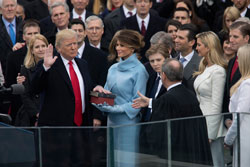After an eventful number of weeks and 14 failed votes, Kevin McCarthy (R) of CA’s 20th district was elected Speaker of the House on Saturday, Jan. 7. Normally, the House successfully elects their speaker in an almost ceremonial way, swearing in new members on the same day as it elects a leader.
In fact, this was the first time since 1923 that the House needed more than a single vote to decide on their speaker. Without a speaker, the House is unable to pass any bills or swear in its new members.
This includes things like agreeing on raising the debt ceiling – a necessary measure to avoid a government shutdown.
In the days surrounding the election, Republican representatives commented on the vote as a way to set the tone for this Congress, so the delay in selecting their speaker is likely a portent of the sort of governing we can expect from the Republican majority these next two years.
In order to secure enough votes for the speakership, McCarthy has made a number of concessions, mostly to far-right members of the Republican Party, many of whom are a part of the Freedom Caucus, which will limit his power. The Freedom Caucus is generally loyal to former President Donald Trump and notably includes Marjorie Taylor Green, Jim Jordan, Scott Perry, and Lauren Boebert. Some outlets have asserted that he may be entering his speakership in the weakest position of any speaker.
Concessions include adjustments to how bills can be brought to the House floor and voted on, relaxation of rules allowing amendments to bills, and many concessions related to government spending. McCarthy has agreed to hold votes on term limits and border security as well. Perhaps most significantly, he has also agreed to lower the threshold for initiating a “motion to vacate,” the process for replacing the Speaker, from five members to one.
He has also reportedly agreed to appoint more members of the Freedom Caucus to the House Rules Committee, which is generally understood to be one of the most powerful committees in Congress due to its power over the processes and procedures around introducing new legislation to the body.
Gina Dige, a freshman graphic design student who described herself as “not in the political world” but was acutely aware of the speaker election, noted, “Politics are so polarized right now. No one cares about what is actually going on and everything seems like a petty popularity contest.”

